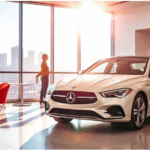Zero-down car loans are getting more popular. They let buyers drive off in a new car without paying a down payment. This makes it easier for people to get a car, as they can use their money for other things.

Exploring zero-down car loans, we see both good and bad sides. In this article, we’ll look closely at zero-down car loans. We aim to help you decide if this is the right choice for you.
Key Takeaways
- Zero-down car loans allow buyers to purchase a vehicle without making a down payment
- These loans are one of the many car loan options available in the market
- Zero-down car loans can be beneficial for buyers who want to allocate their funds to other expenses
- Understanding the benefits and risks of zero-down car loans is crucial for making an informed decision
- Zero-down car loans may have higher interest rates and monthly payments compared to traditional car loans
Understanding Zero-Down Payment Car Loans
Zero-down payment car loans are becoming more popular, especially for first-time buyers. They let you buy a car without paying anything upfront. No money down auto financing is offered by many lenders, so you can get a new car without paying anything first.
Zero-down payment loans are different from regular car loans. Regular loans need a down payment, which is 10% to 20% of the car’s price. Zero-down loans don’t need any money upfront, making them easier for more people to get.
What Exactly is a Zero-Down Payment Car Loan?
A zero-down payment car loan lets you buy a car without paying anything first. These loans are given by lenders who focus on no money down auto financing. You can use them for new or used cars.
How These Loans Differ from Traditional Auto Financing
The big difference is no down payment needed. Regular loans ask for a down payment to lower your monthly payments. Zero-down loans don’t need a down payment but might have higher monthly payments and interest rates.
Eligibility Requirements for Zero-Down Loans
To get a zero-down payment car loan, you need a good credit score and steady income. Lenders might also want you to have some savings or assets for car financing with no down payment.
Before choosing a zero-down payment loan, read the terms carefully. It’s important to know the interest rates, monthly payments, and any extra fees. This way, you can make a smart choice and find the best car financing for you.
The Appeal of No Money Down: Why Buyers Choose These Loans
Many buyers are attracted to zero-down payment car loans. They offer flexibility and convenience. You can drive away in a new car without a big upfront payment. This is great for those who don’t have a lot of savings or want to keep their money for other things.
Zero-down payment car loans have several benefits:
- No initial payment required
- Lower monthly payments
- Flexibility to use savings for other expenses
Understanding auto financing tips helps buyers make smart choices. Knowing the loan terms can prevent problems and ensure a fair deal. Zero-down loans are a good option for anyone looking to buy a new car.
Zero-down loans also give buyers more freedom to pick the car they want. They’re not stuck by a big down payment. By following car buying advice and auto financing tips, buyers can confidently choose their new vehicle.
| Loan Type | Down Payment | Monthly Payment |
|---|---|---|
| Zero-Down Payment | $0 | $300 |
| Traditional Loan | $1,000 | $250 |
Hidden Costs and Financial Implications
Zero-down payment loans might seem good at first, but they come with risks. They often have higher interest rates and bigger monthly payments. Higher interest rates can make the loan more expensive over time.
Higher Interest Rates and Monthly Payments
Loans with no down payment usually have higher interest rates. This means bigger monthly payments. For people with tight budgets, this can be a big problem. It’s important to look closely at the loan terms and think about the risks before deciding.
Impact on Total Loan Cost
Zero-down payment loans can greatly increase the total cost of the loan. Borrowers might pay a lot more in interest over time. It’s key to compare the benefits of these loans with the risks. Also, think about other ways to finance your car.
Insurance Requirements and Additional Expenses
Zero-down payment loans might also mean extra costs, like insurance needs. Borrowers should check the loan terms carefully. This way, they can understand all the costs before deciding.
Credit Score Requirements and Qualification Process
When it comes to car loan eligibility, credit scores are key. Lenders look at credit scores to see if you’ll pay back the loan. A good score can make you more eligible and get you better rates.
To get a zero-down car loan, you usually need a credit score of 700 or more. But, some lenders might accept lower scores, which could mean higher rates. The credit score requirements can change based on the lender and the loan type.
Here are some general guidelines for credit score requirements:
- Excellent credit: 750 or higher
- Good credit: 700-749
- Fair credit: 650-699
- Poor credit: Below 650
Lenders also look at income, job history, and debt-to-income ratio. Checking your credit score and report can help. This ensures there are no mistakes that could hurt your credit score requirements.
The Risk of Negative Equity
Choosing a zero-down payment car loan comes with a risk. This risk is called negative equity. It happens when you owe more on the loan than the car is worth. This can happen because the car’s value drops, often by 20-30% in the first year.
To stay out of trouble, it’s key to know how depreciation and loan balance work together. Depreciation is when the car’s value goes down. The loan balance is how much you still owe. If you owe more than the car’s worth, you’re in trouble.
Understanding Depreciation and Loan Balance
Avoiding negative equity starts with smart car buying. Think about the car’s depreciation rate, the loan term, and the interest rate. A longer loan or higher interest can up the risk of owing more than the car’s worth.
Strategies to Avoid Underwater Loans
Here are ways to lower the risk of negative equity:
- Put down a big chunk of money to start with
- Go for a shorter loan term to pay it off faster
- Choose a car that doesn’t lose value as quickly
- Keep an eye on how much you owe and the car’s value
By knowing the risks of negative equity and using these strategies, you can make better choices. This way, you’re less likely to end up with an underwater loan.
Comparing Zero-Down Loans with Traditional Financing Options
When looking at car loans, it’s key to understand the differences between zero-down loans and traditional financing. Traditional loans often need a down payment, which can be a big upfront cost. But, they might offer better interest rates and terms over time.
On the other hand, zero-down loans are easier to get but might have higher interest rates and monthly payments. It’s crucial to weigh these factors when deciding. By looking at both options, buyers can choose what’s best for their finances.
Some important things to think about when comparing zero-down loans and traditional financing include:
- Interest rates and monthly payments
- Loan terms and conditions
- Down payment requirements
- Total cost of the loan
By carefully looking at these points and comparing car loans, buyers can find the best fit for their needs and budget.
Dealer Incentives and Marketing Tactics
When you buy a car, knowing about dealer incentives and marketing tactics is key. These can be tricky, so it’s important to read the fine print. Dealer incentives might look good at first but could cost you more later.
Car marketing often tries to make you feel like you need to act fast. You might see limited-time offers or special deals. Take your time to make sure these offers really fit your needs and budget.
Common Strategies to Watch For
- Low introductory interest rates that increase after a certain period
- Discounts that are only applicable to specific models or trim levels
- Additional fees or charges that are not clearly disclosed
To avoid these tricks, do your homework and compare prices. Read the fine print of any offer carefully. This way, you can make a smart choice and avoid trouble. Remember, these tactics are meant to help the dealer, not you. So, always think about what’s best for you when buying a car.
By knowing these tactics and taking your time, you can have a better car buying experience. It’s okay to say no if a deal doesn’t feel right. Your financial health is important.
| Dealer Incentive | Description |
|---|---|
| Discounts | Reduced prices on specific models or trim levels |
| Low-interest rates | Introductory interest rates that may increase after a certain period |
| Free upgrades | Additional features or services included with the purchase of a vehicle |
When Zero-Down Payment Car Loans Make Sense
Zero-down car loans can be very appealing, especially for those who want a new car without a big upfront cost. But, it’s important to know when this option is best for you.
Zero-down car loans are great for those with stable jobs, good credit, and a solid payment history. They offer lower initial costs, easier approval, and flexible payment plans.
Key Considerations for Zero-Down Car Loans
- Lower upfront costs: Zero-down car loans eliminate the need for a significant down payment, making it easier for buyers to purchase a vehicle.
- Easier qualification: Zero-down car loans often have more lenient qualification requirements, making it possible for buyers with less-than-perfect credit to qualify.
- More flexible payment terms: Zero-down car loans can offer more flexible payment terms, including longer repayment periods and lower monthly payments.
It’s important to think about the downsides of zero-down car loans too. These include higher interest rates and larger monthly payments over time. By weighing the good and bad, you can decide if a zero-down car loan is right for you.

Red Flags to Watch For
While zero-down car loans have benefits, there are also risks. These include higher interest rates, longer loan times, and the chance of owing more on the car than it’s worth. Knowing these risks can help you avoid costly mistakes.
| Zero-Down Car Loan Benefits | Ideal Scenarios |
|---|---|
| Lower upfront costs | Stable income, good credit score |
| Easier qualification | Less-than-perfect credit, reliable payment history |
| More flexible payment terms | Longer repayment periods, lower monthly payments |
Alternative Car Financing Options
Looking for car loan alternatives? It’s key to check out different options to get a car without spending too much. Options like leasing let you use a car for a set time for monthly payments. This can be a good choice for those who can’t get traditional loans.
Peer-to-peer lending connects you with investors for loans. This might give you better rates and terms than banks. Also, some dealerships and car makers offer in-house financing. This is another way to get a loan without going to a bank.
- Lower monthly payments
- More flexible repayment terms
- Access to a wider range of vehicles
It’s important to look into and compare these alternative financing options. This way, you can choose the best one for your budget and needs. By exploring these alternatives, you can get your dream car without worrying about money.
Alternative car financing options can provide a more affordable and flexible way to secure a vehicle, but it’s essential to carefully review the terms and conditions before making a decision.
Conclusion: Making an Informed Decision About Zero-Down Car Loans
When looking into car financing, it’s key to think carefully about zero-down loans. They might look good at first, but it’s important to look at the big picture. Consider the downsides like higher interest rates and bigger monthly payments.
Remember, a smart approach to car loan conclusion and informed car buying can protect you from money troubles. Look into other financing choices and always read the fine print. Be cautious of dealer tricks that might not be good for you. By understanding zero-down loans well, you can make a choice that helps your finances in the long run.
FAQ
What is a zero-down payment car loan?
A zero-down payment car loan lets you buy a car without paying any money upfront. This is becoming more popular because it means you don’t need a lot of cash to get a car.
How do zero-down payment car loans differ from traditional auto financing?
Zero-down loans don’t need a down payment, unlike traditional financing. Traditional loans usually ask for 10% to 20% of the car’s price upfront. Zero-down loans let you finance the whole car, without any down payment.
What are the eligibility requirements for zero-down payment car loans?
To get a zero-down loan, you usually need a good credit score and a steady job. You also need to have a low debt-to-income ratio. Some lenders might ask for specific income levels or other financial details.
What is the appeal of zero-down payment car loans?
Zero-down loans are appealing because they let you buy a car without a big upfront payment. This is great for those who don’t have savings or want to keep their cash for other things. They also offer more flexibility in the car-buying process.
What are the hidden costs and financial implications of zero-down payment car loans?
Zero-down loans might seem good, but they have hidden costs. These can include higher interest rates and bigger monthly payments. They also increase the risk of owing more on the loan than the car’s worth. Plus, you might need to pay more for insurance, adding to the overall cost.
What are the credit score requirements for zero-down payment car loans?
To qualify for a zero-down loan, you usually need a credit score of 660 or higher. Lenders also look at your job history and how much debt you have compared to your income.
What is the risk of negative equity with zero-down payment car loans?
One big risk of zero-down loans is negative equity. This happens when you owe more on the loan than the car is worth. It can make it hard to trade in or sell the car. It also affects your ability to get financing for a new car later.
How do zero-down payment car loans compare to traditional financing options?
Zero-down loans and traditional financing have big differences. Traditional loans need a down payment, which can lower the loan cost but requires a big upfront payment. Zero-down loans offer more flexibility but might have higher interest rates and more financial risks.
What should I be aware of when it comes to dealer incentives and marketing tactics?
When looking at zero-down loans, watch out for dealer incentives and marketing tricks. Dealers might offer special rates or financing deals to encourage zero-down loans. Always read the fine print and understand all the terms before signing.
When do zero-down payment car loans make sense?
Zero-down loans might be good if you have a stable job, a good credit score, and can handle the higher payments and risks. But they’re not for everyone. Think carefully about your financial situation and goals before choosing a financing option.
What are some alternative car financing options?
There are other financing options besides zero-down loans. You could consider traditional loans with a down payment, leasing, or using a personal or home equity loan. Each option has its own pros and cons. It’s important to research and compare them to find the best fit for you.






